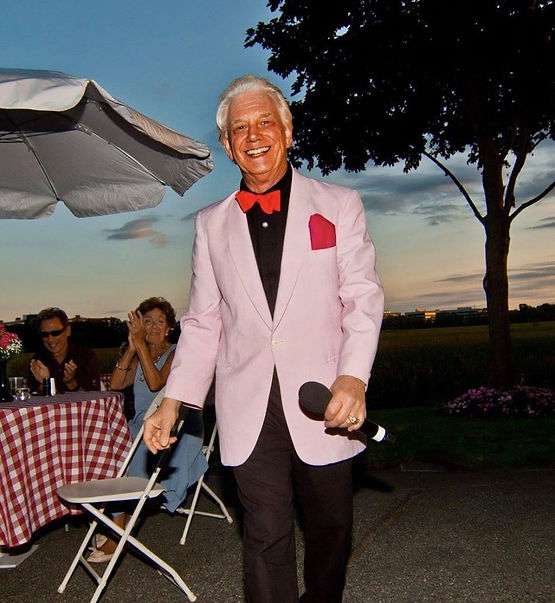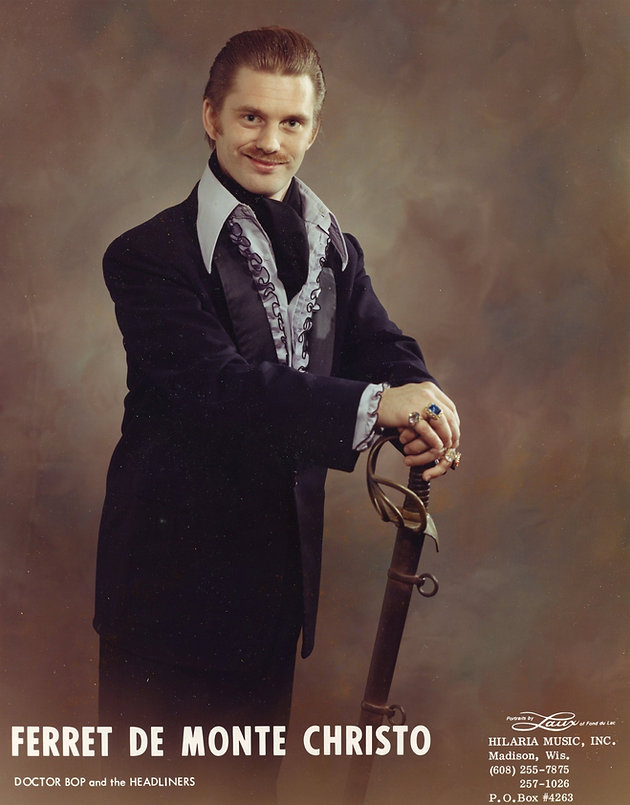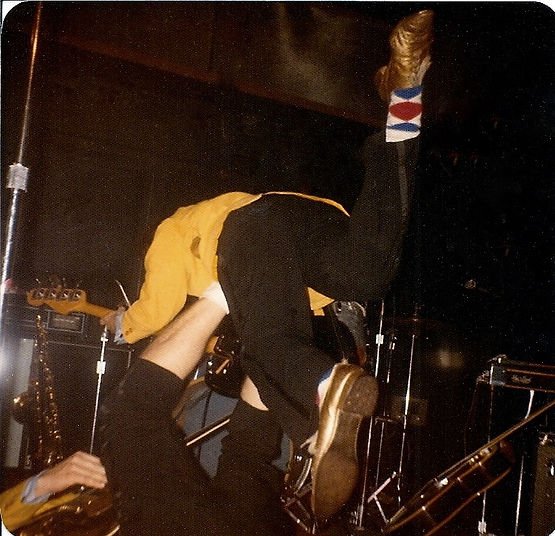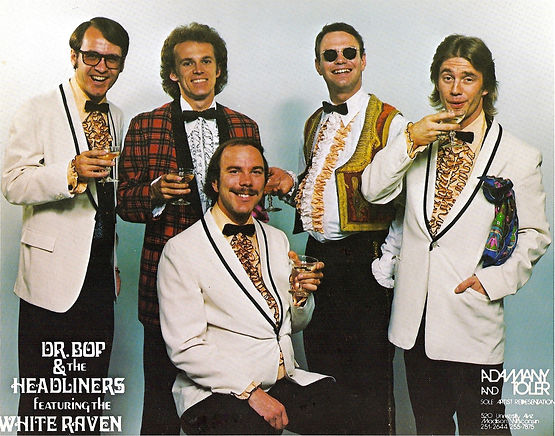
Ned Engelhart (photo: Dr. Bop and the Headliners featuring The White Raven Facebook page)
The announcement, made Wednesday by his bandmate Al Craven on Facebook’s Dr. Bop and the Headliners featuring The White Raven tribute page, came as a sudden, sad shock.
“It is with deep sadness that I convey the news of the passing of loving father, dear friend, and entertainer extraordinaire Ned Engelhart,” wrote Craven, the “White Raven” vocalist/frontman of the legendary midwestern rock ‘n’ roll show band Dr. Bop & the Headliners during its 1971-79 heyday.
“He filled many a heart with great joy. Our sympathies go out to his wonderful daughters Jessica and Jennifer. Thoughts are also with all who were fortunate enough to share musical experiences with Ned over the years.”
Ned Engelhart, Dr. Bop’s bassist/saxophonist/vocalist known by his Ferret de Monte Cristo stage name, died Wednesday in Hayward, Wisconsin, at 75. He left behind countless fans and friends, many likewise taking to Facebook to second Craven’s grief.
“That man lived a fun-filled, full life,” said one fan of many who met Engelhart when Dr. Bop played their Boston stronghold chub Lucifer’s. “He brought so much joy to millions through music and his expressions. What a smile.”
A fan of the band from its Madison, Wis. home base, who saw Engelhart’s latest Dr. Bop incarnation Count Bop & the Headliners last December in Waunakee, likewise testified, “A piece of my heart went to heaven with you! RIP sweet Ned, play your saxophone & watch over us.”
Dr. Bop’s late drummer/emcee and fellow founding member Mike Riegel, who as Dr. Newt Bop gave the rest of the band their stage handles, rightly characterized the band as offering “almost too much entertainment,” with Engelhart showing “the athleticism of a young mountain goat” and the impact of “a bull rhino on a plane.”
True, the Dr. Bop repertoire was strictly covers of 1950s and ‘60s rock ‘n’ roll classics—perfectly rendered. But it was delivered with such crowd-thrilling antics as hanging from the venue’s rafters, scaling 30-foot curtains and dangling upside-down, rappelling out of 25-foot ceilings on mountain climbing rope (at Lucifer's), jumping rope using a tux coat on top of a flimsy piano, and performing in numerous group formations including pyramids and one guitarist suspended in mid-air upon the feet of another lying on his back—both exchanging solos!
Dr. Bop & the Headliners featuring the White Raven
A comment on a Dr. Bop YouTube video recalled that at the Michigan Palace in Detroit, where Dr. Bop opened for The New York Dolls on New Year’s Eve in the mid-’70s, Dr. Bop, whom the witness had never even heard of, “completely stole the show from the Dolls, I mean they really handed them their ass.”
“They were tight, the music was clear and the energy was over the top, not to mention a good selection of tunes. Just a really good set complete with a crazy man climbing the stage curtains half way to the ceiling. By the time the Dolls, who everyone came to see came on, the crowd was drained [and] at least half the audience went somewhere else to finish the evening. ‘Pulling a Dr. Bop’ became part of our lexicon after that, [for] any time someone came out of nowhere and beat the champ or stole the show.”
According to Craven, whom Dr. Bop called “half man, half bird” (and “the original mountain of manhood”) when he christened him the White Raven upon joining the band (and being required to drink a pitcher of beer prior to going on stage at his first gig and chortling “That’ll Be the Day”), “We had each other’s backs when we opened for the Dolls. We didn’t know what to expect, but the crowd went nuts. Same thing when we played the Whisky a Go Go in L.A. No one knew who we were, but we nailed that crowd, too. They went crazy.”
A Facebook fan recalled a Dr. Bop show in 1973 at Milwaukee’s Riverside Theater, with Cheap Trick opening: “It was the first, last, and only time in my life in which I witnessed a band [Cheap Trick] booed off the stage. The Headliners came out and lit up the Riverside and drove the crowd into a frenzy. An unforgettable moment in my life.”
Dr. Bop & the Headliners were managed out of Madison by the Adamany & Toler agency, which also managed Cheap Trick. They later opened for Cheap Trick, as well as such artists as Chuck Berry, Del Shannon, Todd Rundgren, Bob Hope and The Eagles.
“I’d tell my friends that Dr. Bop was the hottest band in town, but that people had to get to the club three hours before they started playing,” says Rockin’ John McDonald, longtime host of Madison’s weekly I Like It Like That oldies show on listener-sponsored station WORT-FM, who attended countless Dr. Bop shows and does an uncanny imitation of Dr. Bop’s wacky band intros.
“The clubs open at six, but the band didn’t play until 9:30, so a lot of us were pretty ripped by the time they got on stage!” says McDonald. A Bloomington, Ind. YouTube fan echoed him, stating, “They played monthly for years at The Bluebird, and you had to get there early, or you couldn’t get in.”
The band’s manager Ken Adamany was quoted thusly on Facebook: “They were absolutely amazing. Everybody had to have this band. You couldn’t have a nightclub if you couldn’t book Dr. Bop.”
Engelhart had previously played guitar in another popular Madison band, The Tayles, in the late 1960s.

"From the royal house of Ferrets of France, itself, Ferret was born into a world of the golden service, the slap of the glove and soft 'thuc' of croquet ball on velvet turf. Raised in a Paris town house and a splendid chateau on the Loire, Ferret swears to this day that his first words were 'Call the huntsmen!' A great athlete, Ferret developed his skills early, winning the French Croquet Open three times while still in his teens!" (From an early band bio, courtesy of Al Craven)
“He was a hell of a guitarist,” says Robert Kenison, who under the name Troy Charmell played guitar and piano with Dr. Bop & the Headliners, having also achieved success earlier with the Beatles-inspired band The Gentlemen.
“He played bass in Dr. Bop, but in The Tayles he played lead guitar on Hendrix and Clapton stuff. And he had the highest vocal range in our band, so he could hit the high notes on top of the harmonies without straining. He had a strong, operatic voice for songs like ‘It’s Now or Never,’ and he loved the blues, and sang ‘Stagger Lee’ and those kinds of tunes.”
Maybe most important, continues Kenison, was that Engelhart was fearless.
“He wasn’t afraid to go out into the audience while singing songs like ‘It’s Now or Never’ and sit on a woman’s lap, bring her a glass of champagne and sing directly to her! But the band wouldn’t even have happened if not for Ned, because besides being a great musician, he also did a lot of the road managing: He knew what to do with the equipment, got all our outfits cleaned, and really took care of everything.”

The Ferret, atop Charmell, both soloing back-and-forth on "Surfin' U.S.A."--from the Dr. Bop and the Headliners featuring The White Raven Facebook page.
“Ned was bigger than life,” agrees Craven. “He really kept the band going—and he was very strong both physically and emotionally, wonderfully expressive, and had great instincts: He was a very accomplished lead guitarist with The Tayles, and I was surprised he played bass and rarely played guitar with Dr. Bop. But he realized, maybe a year and a-half into it, that we needed a sax player, so he just picked up a sax and learned how to play it.”

Vintage promo pic, from left, Speedo (Ken Champion), the White Raven (Al Craven), Troy Charmell (Robert Kenison), Dr. Newt Bop (Mike Riegel), Ferret de Monte Christo (Ned Engelhart). From the Dr. Bop and the Headliners featuring The White Raven Facebook page, and taken, says Kenison, during the band's "paunch days," as signified by "the three-martini paunch."
“He was such a great guy,” says McDonald. “What can I say? It was one of my all-time favorite bands, and Ned was a multi-talented musician—who learned how to play sax on the fly! And Al told me that he and Mike were two of the strongest people he’d ever met: They’d jump on each other’s backs and carry guys around on their shoulders! And he was one of the nicest people I ever met.”
Wesley Reed, a Boston fan of the band since they were regulars at Lucifer’s, frequently brought versions of the band to play private parties posted by him and his wife Robin.
“We have lost a great friend, a great performer and a wonderful man,” they said on Facebook, then expanded on it via email.
“Ned was a multi-talented singer/musician and peerless entertainer and band leader [whose] friendship with The Reeds went back five decades. Many in our world will remember his virtuoso performances during countless events we’ve had through the years. Ned always brought his ‘A game.’”
But the ultimate assessment of Engelhart’s character comes from Larry Byrne, better known, perhaps, as Cleveland St. James from Mike Riegel’s post-Headliners band Dr. Bop’s Nouveau Cabaret Orchestra, which also starred Engelhart, stellar vocalist Ena Patricia McLaughlin (then billed as Ena Anka) and renowned roots music guitarist Mike Dowling (Guy Roy Raye) and had a fully-stocked “Celebrity Bar” on stage--with busy bartender.
Byrne observed, some years ago, that even Engelhart’s pet Ignatz had been “a better cat” for having Engelhart as its human.
On Facebook, where her profile picture shows her singing with Dowling on one side, jazz great and Dr. Bop fanatic Ben Sidran on the other, McLaughlin posted: “My heart is broken. Can hardly imagine a world without him.”
“I’m still shocked he’s not here,” says McDonald, recalling how Engelhart and McLaughlin “absolutely nailed” the “You’re the One That I Want” duet from Grease.
And after Dr. Bop’s Nouveau Cabaret Orchestra ran its course, and Riegel died in 2005, Engelhart continued reinventing himself and the band up until the end. Most recently, he was leading a band called Count Bop & the Headliners, and was exploring adding ukuleles—for their easier portability—and getting Byrne to switch from piano to accordion.
“He was a dynamo,” says Kenison. “With his energy and drive, we always thought he’d be the last man standing.”
Recent Posts
Archive




